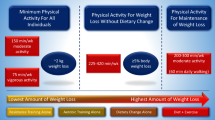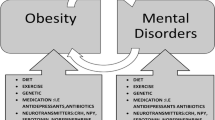Abstract
Purpose
Results examining associations between metabolic syndrome (MetS) and depression, as well as on quality of life (QoL), are inconsistent. We aimed to determine whether individuals with MetS had decreased mental health-related QoL (MH-QoL) and higher frequency of depressive symptoms.
Methods
Data from 1,015 participants from the Fels Longitudinal Study were analyzed (mean age ± SD: 49.6 ± 18.7 years, 29.3% MetS, 51% females). MetS was determined using American Heart Association/National Heart, Lung, and Blood Institute criteria. Depressive symptoms (yes vs. no) were assessed with The Patient Health Questionnaire-9 (PHQ-9). MH-QoL (low (≤ 42) vs. high) was assessed with The Medical Outcomes 36-Item Short Form Survey (SF-36). Sex- and age-stratified mixed effects logistic regressions were used to examine the longitudinal relationship between MetS and MH-QoL while adjusting for covariates such as age, smoking status, and drinking status.
Results
In cross-sectional analysis, MetS was significantly associated with elevated depressive symptoms in women (OR 2.14, 95% CI 1.22–3.78, p < 0.01), but not in men. In the longitudinal analysis, MetS was observed to have a protective effect among men in the older age group as it approached significance (OR 0.34, 95% CI 0.11–1.05, p = 0.06).
Conclusion
MetS was adversely associated with depressive symptoms and poor MH-QoL. Our cross-sectional results suggest that depressive symptoms are higher among women with MetS. Interestingly, our longitudinal results suggest that MH-QoL in men with MetS may improve with age.
Similar content being viewed by others
References
Huang, P. L. (2009). A comprehensive definition for metabolic syndrome. Disease Models & Mechanisms,2(5–6), 231–237. https://doi.org/10.1242/dmm.001180.
Saboya, P. P., Bodanese, L. C., Zimmermann, P. R., Gustavo, A. D., Assumpcao, C. M., & Londero, F. (2016). Metabolic syndrome and quality of life: A systematic review. Revista Latino-Americana de Enfermagem,24, e2848. https://doi.org/10.1590/1518-8345.1573.2848.
Moore, J. X., Chaudhary, N., & Akinyemiju, T. (2017). Metabolic syndrome prevalence by race/ethnicity and sex in the United States, national health and nutrition examination survey, 1988–2012. Preventing Chronic Disease,14, E24. https://doi.org/10.5888/pcd14.160287.
Aguilar, M., Bhuket, T., Torres, S., Liu, B., & Wong, R. J. (2015). Prevalence of the metabolic syndrome in the United States, 2003–2012. JAMA,313(19), 1973–1974. https://doi.org/10.1001/jama.2015.4260.
Soltani, M., Smith, S., Beck, E., & Johnson, M. (2015). Universal depression screening, diagnosis, management, and outcomes at a student-run free clinic. Academic Psychiatry,39(3), 259–266. https://doi.org/10.1007/s40596-014-0257-x.
Services, S. O. T. U. S. D. O. H. A. H. (2018). Health, United States, 2017: With Special Feature on Mortality (Health, United States). Hyattsville, MD: National Center for Health Statistics
John Mann, J., Ellis, S. P., Currier, D., Zelazny, J., Birmaher, B., Oquendo, M. A., et al. (2016). Self-rated depression severity relative to clinician-rated depression severity: Trait stability and potential role in familial transmission of suicidal behavior. Archives of Suicide Research,20(3), 412–425. https://doi.org/10.1080/13811118.2015.1033504.
Akincigil, A., & Matthews, E. B. (2017). National rates and patterns of depression screening in primary care: Results from 2012 and 2013. Psychiatric Services,68(7), 660–666. https://doi.org/10.1176/appi.ps.201600096.
Smithson, S., & Pignone, M. (2017). Screening adults for depression in primary care. The Medical Clinics of North America,101(4), 807–821. https://doi.org/10.1016/j.mcna.2017.03.010.
Kahl, K. G., Schweiger, U., Correll, C., Muller, C., Busch, M. L., Bauer, M., et al. (2015). Depression, anxiety disorders, and metabolic syndrome in a population at risk for type 2 diabetes mellitus. Brain and Behavior,5(3), e00306. https://doi.org/10.1002/brb3.306.
Ahn, S., Kim, S., & Zhang, H. (2017). Changes in depressive symptoms among older adults with multiple chronic conditions: Role of positive and negative social support. International Journal of Environmental Research and Public Health,14(1), 16. https://doi.org/10.3390/ijerph14010016.
Simon, G. E. (2001). Treating depression in patients with chronic disease: Recognition and treatment are crucial; Depression worsens the course of a chronic illness. Western Journal of Medicine,175(5), 292–293.
East, C., Willis, B. L., Barlow, C. E., Grannemann, B. D., FitzGerald, S. J., DeFina, L. F., et al. (2010). Depressive symptoms and metabolic syndrome in preventive healthcare: The Cooper Center longitudinal study. Metabolic Syndrome and Related Disorders,8(5), 451–457. https://doi.org/10.1089/met.2010.0017.
Marijnissen, R. M., Smits, J. E., Schoevers, R. A., van den Brink, R. H., Holewijn, S., Franke, B., et al. (2013). Association between metabolic syndrome and depressive symptom profiles–sex-specific? Journal of Affective Disorders,151(3), 1138–1142. https://doi.org/10.1016/j.jad.2013.07.029.
Womack, V. Y., De Chavez, P. J., Albrecht, S. S., Durant, N., Loucks, E. B., Puterman, E., et al. (2016). A longitudinal relationship between depressive symptoms and development of metabolic syndrome: The coronary artery risk development in young adults study. Psychosomatic Medicine,78(7), 867–873. https://doi.org/10.1097/PSY.0000000000000347.
Onyewuenyi, I. C., Muldoon, M. F., Christie, I. C., Erickson, K. I., & Gianaros, P. J. (2014). Basal ganglia morphology links the metabolic syndrome and depressive symptoms. Physiology & Behavior,123, 214–222. https://doi.org/10.1016/j.physbeh.2013.09.014.
Okosun, I. S., Annor, F., Esuneh, F., & Okoegwale, E. E. (2013). Metabolic syndrome and impaired health-related quality of life and in non-Hispanic White, non-Hispanic Blacks and Mexican-American Adults. Diabetes & Metabolic Syndrome: Clinical Research & Reviews,7(3), 154–160. https://doi.org/10.1016/j.dsx.2013.06.007.
Ford, E. S., & Li, C. (2008). Metabolic syndrome and health-related quality of life among U.S. adults. Annals of Epidemiology,18(3), 165–171. https://doi.org/10.1016/j.annepidem.2007.10.009.
Shinkov, A., Borissova, A. M., Kovatcheva, R., Vlahov, J., Dakovska, L., Atanassova, I., et al. (2018). Increased prevalence of depression and anxiety among subjects with metabolic syndrome and known type 2 diabetes mellitus—A population-based study. Postgraduate Medicine,130(2), 251–257. https://doi.org/10.1080/00325481.2018.1410054.
Virtanen, M., Ferrie, J. E., Akbaraly, T., Tabak, A., Jokela, M., Ebmeier, K. P., et al. (2017). Metabolic syndrome and symptom resolution in depression: A 5-year follow-up of older adults. Journal of Clinical Psychiatry,78(1), e1–e7. https://doi.org/10.4088/JCP.15m10399.
Yellow Springs, OH. (2019). Wikipedia: The free encyclopedia. Retrieved from https://en.wikipedia.org/wiki/Yellow_Springs,_Ohio
Roche, A. F. (1992). Growth, maturation, and body composition: The Fels Longitudinal Study, 1929–1991. New York: Cambridge University Press.
Alberti, K. G., Eckel, R. H., Grundy, S. M., Zimmet, P. Z., Cleeman, J. I., Donato, K. A., et al. (2009). Harmonizing the metabolic syndrome: A joint interim statement of the International Diabetes Federation Task Force on Epidemiology and Prevention; National Heart, Lung, and Blood Institute; American Heart Association; World Heart Federation; International Atherosclerosis Society; and International Association for the Study of Obesity. Circulation,120(16), 1640–1645. https://doi.org/10.1161/CIRCULATIONAHA.109.192644.
The multiple risk factor intervention trial (MRFIT). (1976). A national study of primary prevention of coronary heart disease. JAMA,235(8), 825–827.
Kulkarni, K. R. (2006). Cholesterol profile measurement by vertical auto profile method. Clinics in Laboratory Medicine,26(4), 787–802. https://doi.org/10.1016/j.cll.2006.07.004.
Kroenke, K., Spitzer, R. L., & Williams, J. B. (2001). The PHQ-9: Validity of a brief depression severity measure. Journal of General Internal Medicine,16(9), 606–613.
Pfizer, I. (1999). PHQ-9 patient depression questionnaire. https://www.uspreventiveservicestaskforce.org/Home/GetFileByID/218.
Ware, J., Snow, K., Kosinski, M., & Gandek, B. (1993). SF-36 health survey: Manual and interpretation guide. Boston, MA: The Health Institute, New England Medical Center Hospitals Inc.
Lins, L., & Carvalho, F. M. (2016). SF-36 total score as a single measure of health-related quality of life: Scoping review. SAGE Open Medicine,4, 2050312116671725. https://doi.org/10.1177/2050312116671725.
Jenkinson, C. (1999). Comparison of UK and US methods for weighting and scoring the SF-36 summary measures. Journal of Public Health Medicine,21(4), 372–376.
Leese, M., Schene, A., Koeter, M., Meijer, K., Bindman, J., Mazzi, M., et al. (2008). SF-36 scales, and simple sums of scales, were reliable quality-of-life summaries for patients with schizophrenia. Journal of Clinical Epidemiology,61(6), 588–596. https://doi.org/10.1016/j.jclinepi.2007.08.004.
Baecke, J. A., Burema, J., & Frijters, J. E. (1982). A short questionnaire for the measurement of habitual physical activity in epidemiological studies. American Journal of Clinical Nutrition,36(5), 936–942. https://doi.org/10.1093/ajcn/36.5.936.
Liaw, F. Y., Kao, T. W., Hsueh, J. T., Chan, Y. H., Chang, Y. W., & Chen, W. L. (2015). Exploring the link between the components of metabolic syndrome and the risk of depression. BioMed Research International,2015, 586251. https://doi.org/10.1155/2015/586251.
Cooper, D. C., Trivedi, R. B., Nelson, K. M., Reiber, G. E., Zonderman, A. B., Evans, M. K., et al. (2013). Sex differences in associations of depressive symptoms with cardiovascular risk factors and metabolic syndrome among African Americans. Cardiovascular Psychiatry and Neurology,2013, 979185. https://doi.org/10.1155/2013/979185.
Laudisio, A., Marzetti, E., Pagano, F., Pozzi, G., Bernabei, R., & Zuccala, G. (2009). Depressive symptoms and metabolic syndrome: Selective association in older women. Journal of Geriatric Psychiatry and Neurology,22(4), 215–222. https://doi.org/10.1177/0891988709335793.
Vetter, M. L., Wadden, T. A., Lavenberg, J., Moore, R. H., Volger, S., Perez, J. L., et al. (2011). Relation of health-related quality of life to metabolic syndrome, obesity, depression and comorbid illnesses. International Journal of Obesity (Lond),35(8), 1087–1094. https://doi.org/10.1038/ijo.2010.230.
Laudisio, A., Marzetti, E., Antonica, L., Pagano, F., Vetrano, D. L., Bernabei, R., et al. (2013). Metabolic syndrome and quality of life in the elderly: Age and gender differences. European Journal of Nutrition,52(1), 307–316. https://doi.org/10.1007/s00394-012-0337-1.
Wott, C. B., & Carels, R. A. (2010). Overt weight stigma, psychological distress and weight loss treatment outcomes. Journal of Health Psychology,15(4), 608–614. https://doi.org/10.1177/1359105309355339.
Pan, A., Keum, N., Okereke, O. I., Sun, Q., Kivimaki, M., Rubin, R. R., et al. (2012). Bidirectional association between depression and metabolic syndrome: A systematic review and meta-analysis of epidemiological studies. Diabetes Care,35(5), 1171–1180. https://doi.org/10.2337/dc11-2055.
Ho, C., Zhang, M., Mak, A., & Ho, R. (2014). Metabolic syndrome in psychiatry: Advances in understanding and management. Advances in Psychiatric Treatment,20, 101–112. https://doi.org/10.1192/apt.bp.113.011619.
Carter, J. D., Frampton, C. M., Mulder, R. T., Luty, S. E., & Joyce, P. R. (2010). The relationship of demographic, clinical, cognitive and personality variables to the discrepancy between self and clinician rated depression. Journal of Affective Disorders,124(1–2), 202–206. https://doi.org/10.1016/j.jad.2009.11.011.
Epstein, J., Barker, P., & Kroutil, L. (2001). Mode effects in self-reported mental health data. Public Opinion Quarterly,65(4), 529–549. https://doi.org/10.1086/323577.
Levin-Aspenson, H. F., & Watson, D. (2018). Mode of administration effects in psychopathology assessment: Analyses of gender, age, and education differences in self-rated versus interview-based depression. Psychological Assessment,30(3), 287–295. https://doi.org/10.1037/pas0000474.
Guyot, E., Baudry, J., Hercberg, S., Galan, P., Kesse-Guyot, E., & Péneau, S. (2018). Mindfulness is associated with the metabolic syndrome among individuals with a depressive symptomatology. Nutrients,10(232), 1–13. https://doi.org/10.3390/nu10020232.
Saboya, P. P., Bodanese, L. C., Zimmermann, P. R., da Silva Gustavo, A., Macagnan, F. E., Feoli, A. P., et al. (2017). Lifestyle intervention on metabolic syndrome and its impact on quality of life: A randomized controlled trial. Arquivos Brasileiros de Cardiologia,108(1), 60–69. https://doi.org/10.5935/abc.20160186.
Manea, L., Gilbody, S., & McMillan, D. (2012). Optimal cut-off score for diagnosing depression with the Patient Health Questionnaire (PHQ-9): A meta-analysis. CMAJ,184(3), E191–E196. https://doi.org/10.1503/cmaj.110829.
Cardenas, V., Mausbach, B. T., Sommerfeld, D., Jimenez, D., von Kanel, R., Ho, J. S., et al. (2017). Depression is associated with increased risk for metabolic syndrome in latinos with type 2 diabetes. The American Journal of Geriatric Psychiatry,25(6), 646–653. https://doi.org/10.1016/j.jagp.2017.02.017.
Singer, J., & Willett, J. (2003). Applied longitudinal data analysis: Modeling change and event occurrence. New York: Oxford University Press.
Gibbons, R. D., Hedeker, D., & DuToit, S. (2010). Advances in analysis of longitudinal data. Annual Review of Clinical Psychology,6, 79–107. https://doi.org/10.1146/annurev.clinpsy.032408.153550.
Liu, Y., Ozodiegwu, I. D., Yu, Y., Hess, R., & Bie, R. (2017). An association of health behaviors with depression and metabolic risks: Data from 2007 to 2014 U.S. National Health and Nutrition Examination Survey. Journal of Affective Disorders,217, 190–196. https://doi.org/10.1016/j.jad.2017.04.009.
Acknowledgements
We extend our thanks to the research participants of the Fels Longitudinal Study and to all research assistants and staff. This study was supported by grants from the National Institutes of Health: HD012252 and DK111201.
Author information
Authors and Affiliations
Corresponding author
Ethics declarations
Conflict of interest
The authors declare that they have no conflicts of interest. The authors alone are responsible for the content and writing of the paper.
Ethical approval
All procedures performed in studies involving human participants were in accordance with the ethical standards of the UTHealth Science Center School of Public Health research committee (HSC-SPH-17-0262, Miryoung Lee, PI) and with the 1964 Helsinki declaration and its later amendments or comparable ethical standards. This article does not contain any studies with animals performed by any of the authors.
Informed consent
Informed consent was obtained from all individual participants included in the study.
Additional information
Publisher's Note
Springer Nature remains neutral with regard to jurisdictional claims in published maps and institutional affiliations.
Rights and permissions
About this article
Cite this article
Limon, V.M., Lee, M., Gonzalez, B. et al. The impact of metabolic syndrome on mental health-related quality of life and depressive symptoms. Qual Life Res 29, 2063–2072 (2020). https://doi.org/10.1007/s11136-020-02479-5
Accepted:
Published:
Issue Date:
DOI: https://doi.org/10.1007/s11136-020-02479-5




